Motoki Omura
Gradual Transition from Bellman Optimality Operator to Bellman Operator in Online Reinforcement Learning
Jun 06, 2025Abstract:For continuous action spaces, actor-critic methods are widely used in online reinforcement learning (RL). However, unlike RL algorithms for discrete actions, which generally model the optimal value function using the Bellman optimality operator, RL algorithms for continuous actions typically model Q-values for the current policy using the Bellman operator. These algorithms for continuous actions rely exclusively on policy updates for improvement, which often results in low sample efficiency. This study examines the effectiveness of incorporating the Bellman optimality operator into actor-critic frameworks. Experiments in a simple environment show that modeling optimal values accelerates learning but leads to overestimation bias. To address this, we propose an annealing approach that gradually transitions from the Bellman optimality operator to the Bellman operator, thereby accelerating learning while mitigating bias. Our method, combined with TD3 and SAC, significantly outperforms existing approaches across various locomotion and manipulation tasks, demonstrating improved performance and robustness to hyperparameters related to optimality.
Entropy Controllable Direct Preference Optimization
Nov 12, 2024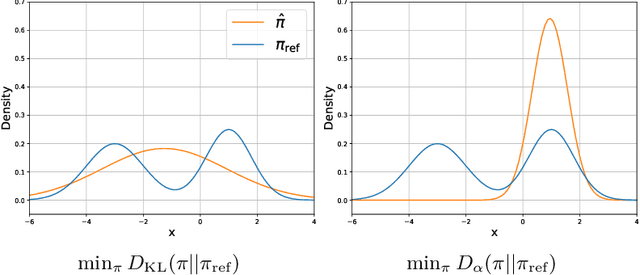


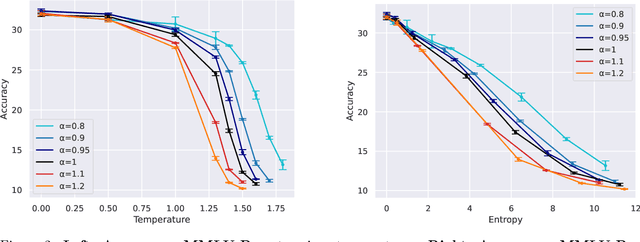
Abstract:In the post-training of large language models (LLMs), Reinforcement Learning from Human Feedback (RLHF) is an effective approach to achieve generation aligned with human preferences. Direct Preference Optimization (DPO) allows for policy training with a simple binary cross-entropy loss without a reward model. The objective of DPO is regularized by reverse KL divergence that encourages mode-seeking fitting to the reference policy. Nonetheless, we indicate that minimizing reverse KL divergence could fail to capture a mode of the reference distribution, which may hurt the policy's performance. Based on this observation, we propose a simple modification to DPO, H-DPO, which allows for control over the entropy of the resulting policy, enhancing the distribution's sharpness and thereby enabling mode-seeking fitting more effectively. In our experiments, we show that H-DPO outperformed DPO across various tasks, demonstrating superior results in pass@$k$ evaluations for mathematical tasks. Moreover, H-DPO is simple to implement, requiring only minor modifications to the loss calculation of DPO, which makes it highly practical and promising for wide-ranging applications in the training of LLMs.
Stabilizing Extreme Q-learning by Maclaurin Expansion
Jun 07, 2024
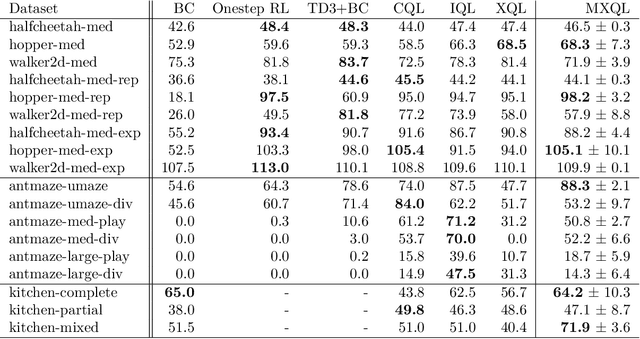

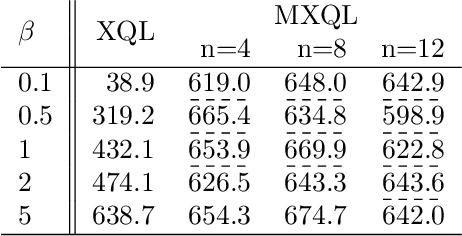
Abstract:In Extreme Q-learning (XQL), Gumbel Regression is performed with an assumed Gumbel distribution for the error distribution. This allows learning of the value function without sampling out-of-distribution actions and has shown excellent performance mainly in Offline RL. However, issues remained, including the exponential term in the loss function causing instability and the potential for an error distribution diverging from the Gumbel distribution. Therefore, we propose Maclaurin Expanded Extreme Q-learning to enhance stability. In this method, applying Maclaurin expansion to the loss function in XQL enhances stability against large errors. It also allows adjusting the error distribution assumption from normal to Gumbel based on the expansion order. Our method significantly stabilizes learning in Online RL tasks from DM Control, where XQL was previously unstable. Additionally, it improves performance in several Offline RL tasks from D4RL, where XQL already showed excellent results.
Symmetric Q-learning: Reducing Skewness of Bellman Error in Online Reinforcement Learning
Mar 12, 2024


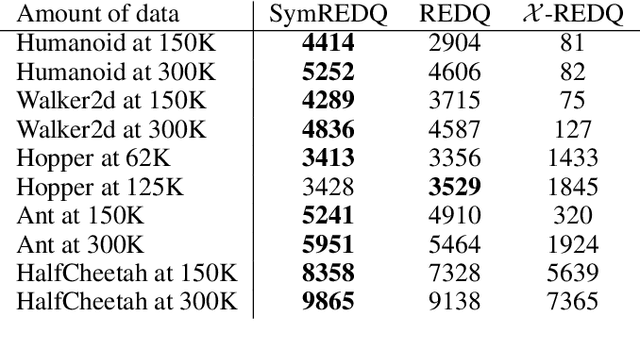
Abstract:In deep reinforcement learning, estimating the value function to evaluate the quality of states and actions is essential. The value function is often trained using the least squares method, which implicitly assumes a Gaussian error distribution. However, a recent study suggested that the error distribution for training the value function is often skewed because of the properties of the Bellman operator, and violates the implicit assumption of normal error distribution in the least squares method. To address this, we proposed a method called Symmetric Q-learning, in which the synthetic noise generated from a zero-mean distribution is added to the target values to generate a Gaussian error distribution. We evaluated the proposed method on continuous control benchmark tasks in MuJoCo. It improved the sample efficiency of a state-of-the-art reinforcement learning method by reducing the skewness of the error distribution.
 Add to Chrome
Add to Chrome Add to Firefox
Add to Firefox Add to Edge
Add to Edge